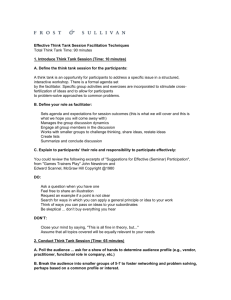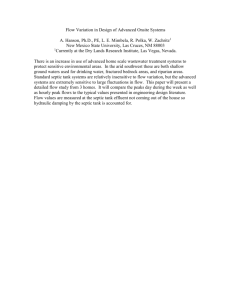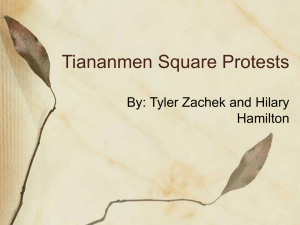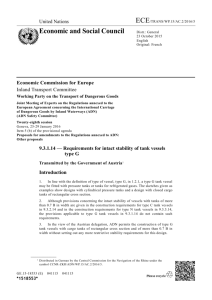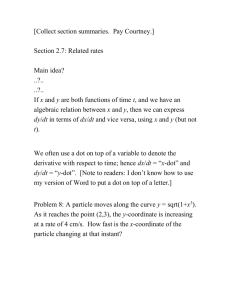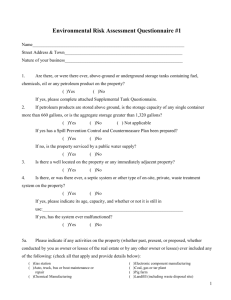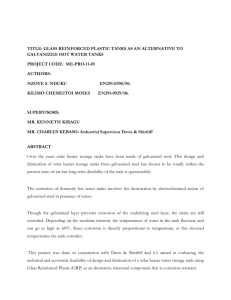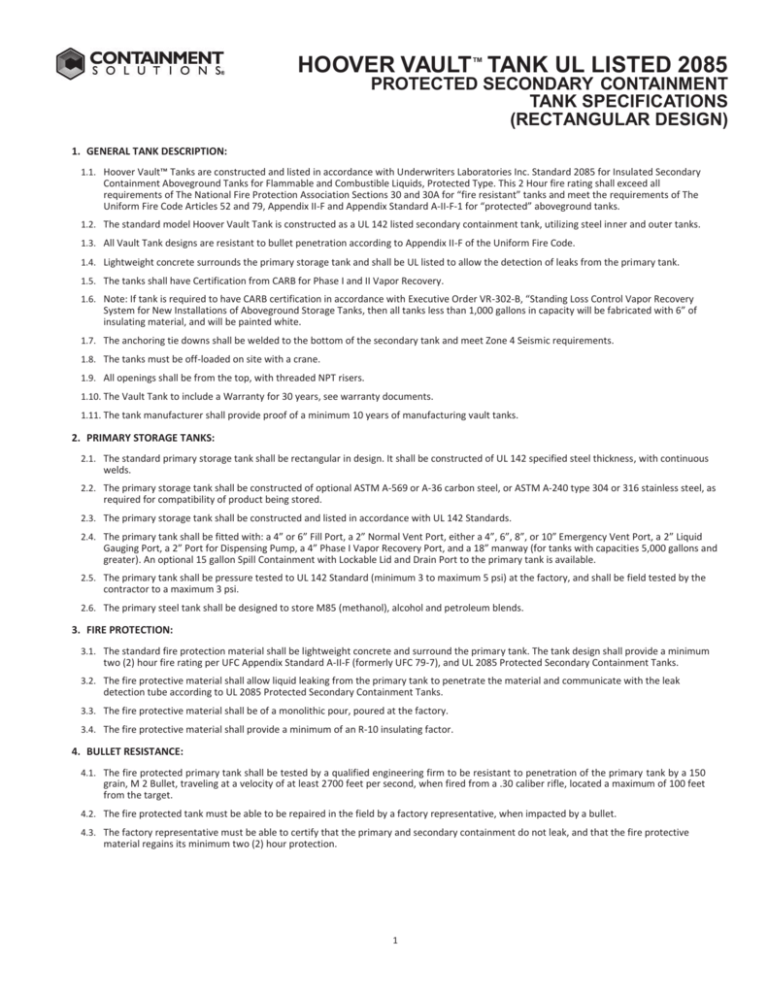
HOOVER VAULT™ TANK UL LISTED 2085
PROTECTED SECONDARY CONTAINMENT
TANK SPECIFICATIONS
(RECTANGULAR DESIGN)
1. GENERAL TANK DESCRIPTION:
1.1. Hoover Vault™ Tanks are constructed and listed in accordance with Underwriters Laboratories Inc. Standard 2085 for Insulated Secondary
Containment Aboveground Tanks for Flammable and Combustible Liquids, Protected Type. This 2 Hour fire rating shall exceed all
requirements of The National Fire Protection Association Sections 30 and 30A for “fire resistant” tanks and meet the requirements of The
Uniform Fire Code Articles 52 and 79, Appendix II-F and Appendix Standard A-II-F-1 for “protected” aboveground tanks.
1.2. The standard model Hoover Vault Tank is constructed as a UL 142 listed secondary containment tank, utilizing steel inner and outer tanks.
1.3. All Vault Tank designs are resistant to bullet penetration according to Appendix II-F of the Uniform Fire Code.
1.4. Lightweight concrete surrounds the primary storage tank and shall be UL listed to allow the detection of leaks from the primary tank.
1.5. The tanks shall have Certification from CARB for Phase I and II Vapor Recovery.
1.6. Note: If tank is required to have CARB certification in accordance with Executive Order VR-302-B, “Standing Loss Control Vapor Recovery
System for New Installations of Aboveground Storage Tanks, then all tanks less than 1,000 gallons in capacity will be fabricated with 6” of
insulating material, and will be painted white.
1.7. The anchoring tie downs shall be welded to the bottom of the secondary tank and meet Zone 4 Seismic requirements.
1.8. The tanks must be off-loaded on site with a crane.
1.9. All openings shall be from the top, with threaded NPT risers.
1.10. The Vault Tank to include a Warranty for 30 years, see warranty documents.
1.11. The tank manufacturer shall provide proof of a minimum 10 years of manufacturing vault tanks.
2. PRIMARY STORAGE TANKS:
2.1. The standard primary storage tank shall be rectangular in design. It shall be constructed of UL 142 specified steel thickness, with continuous
welds.
2.2. The primary storage tank shall be constructed of optional ASTM A-569 or A-36 carbon steel, or ASTM A-240 type 304 or 316 stainless steel, as
required for compatibility of product being stored.
2.3. The primary storage tank shall be constructed and listed in accordance with UL 142 Standards.
2.4. The primary tank shall be fitted with: a 4” or 6” Fill Port, a 2” Normal Vent Port, either a 4”, 6”, 8”, or 10” Emergency Vent Port, a 2” Liquid
Gauging Port, a 2” Port for Dispensing Pump, a 4” Phase I Vapor Recovery Port, and a 18” manway (for tanks with capacities 5,000 gallons and
greater). An optional 15 gallon Spill Containment with Lockable Lid and Drain Port to the primary tank is available.
2.5. The primary tank shall be pressure tested to UL 142 Standard (minimum 3 to maximum 5 psi) at the factory, and shall be field tested by the
contractor to a maximum 3 psi.
2.6. The primary steel tank shall be designed to store M85 (methanol), alcohol and petroleum blends.
3. FIRE PROTECTION:
3.1. The standard fire protection material shall be lightweight concrete and surround the primary tank. The tank design shall provide a minimum
two (2) hour fire rating per UFC Appendix Standard A-II-F (formerly UFC 79-7), and UL 2085 Protected Secondary Containment Tanks.
3.2. The fire protective material shall allow liquid leaking from the primary tank to penetrate the material and communicate with the leak
detection tube according to UL 2085 Protected Secondary Containment Tanks.
3.3. The fire protective material shall be of a monolithic pour, poured at the factory.
3.4. The fire protective material shall provide a minimum of an R-10 insulating factor.
4. BULLET RESISTANCE:
4.1. The fire protected primary tank shall be tested by a qualified engineering firm to be resistant to penetration of the primary tank by a 150
grain, M 2 Bullet, traveling at a velocity of at least 2700 feet per second, when fired from a .30 caliber rifle, located a maximum of 100 feet
from the target.
4.2. The fire protected tank must be able to be repaired in the field by a factory representative, when impacted by a bullet.
4.3. The factory representative must be able to certify that the primary and secondary containment do not leak, and that the fire protective
material regains its minimum two (2) hour protection.
1
5. SECONDARY LEAK CONTAINMENT TANK:
5.1. The secondary leak containment tank shall be rectangular in design and listed according to UL 2085 insulated secondary aboveground tanks for
flammable and combustible liquids, protected type.
5.2. The secondary tank shall be tested liquid tight at the factory (minimum 3 to maximum 5 psi), and shall also be field tested by the contractor
to a maximum 3 psi.
5.3. The secondary tank shall provide reinforcement for the lightweight concrete to remain in place around the primary tank.
5.4. The secondary tank shall provide true 360° Radius “pressure testable” containment for the primary tank.
5.5. The secondary tank shall be fitted with a 2” Annular Space Monitoring Tube, a 2” Normal Vent Port and either a 4”, 6”, 8” or 10” Emergency
Vent Port, in addition to openings for all ports in the primary tank.
5.6. The port openings in the top of the secondary tank shall be constructed with full welds to prevent moisture from seeping between the fire
proofing material and secondary and primary tanks.
5.7. The top of the secondary tank shall be sloped so that water will not accumulate on top of the tank.
5.8. The secondary tank shall have a two (2) inch monitoring port including a tube which provides a means to detect product leakage from the
primary tank into fire protection material that directly surrounds the primary tank. This design shall be listed under UL 2085.
6. COATINGS:
6.1. The exterior surface of the secondary tank shall be cleansed of foreign material and coated with a corrosion resistant industrial paint (3 to 5
mils dry film thickness).
6.2. The standard color shall be desert sand.
6.3. Note: Per section 1.5, if the tank is less than 1,000 gallons and needs to have CARB certification, the tank will be painted white. This
requirement is only applicable to tanks storing gasoline in the state of California.
6.4. Optional FIBERVAULT® coating can be applied to the exterior surface of the secondary tank to provide resistance to corrosive environments
such as salt water spray.
6.4.1. The total dry thickness shall be a minimum of 1/8 inch.
6.4.2. All threaded openings and flanges shall be protected during the coating process.
6.4.3. The coating shall be applied only when the work area and the secondary steel tank are between the temperatures of 32° and 103° F.
6.4.4. The standard color shall be desert sand.
6.4.5. The coating shall provide a 10 year warranty.
Copyright © Containment Solutions, Inc. • All Rights Reserved • January 2014 • Pub. No. TNK 1506E 2


